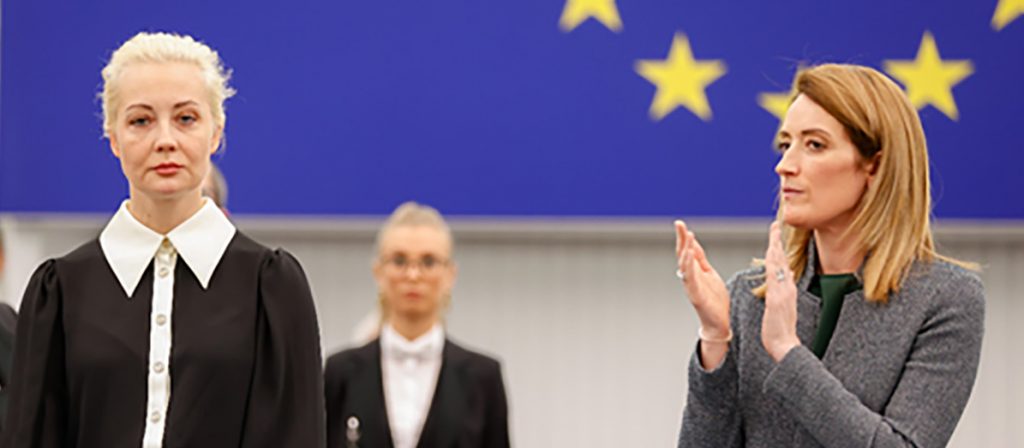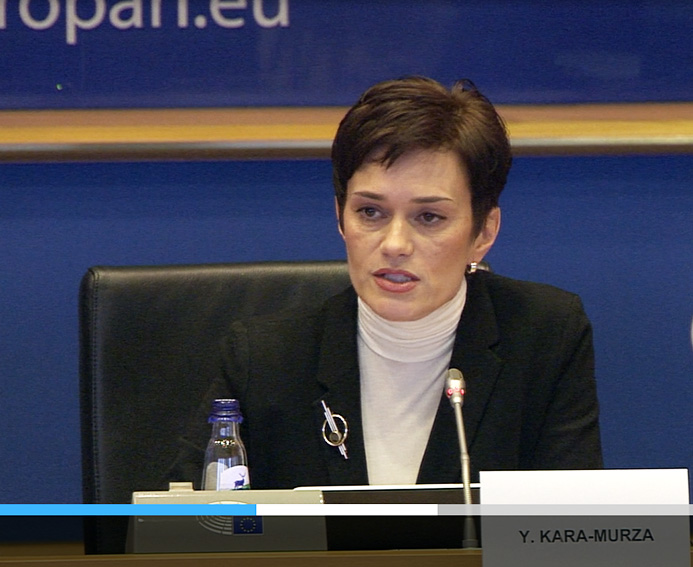International Women’s Day: Independent female politicians and activists are particularly feared and smeared by the Kremlin and its fellows. This International Women’s Day is an opportunity to honour Russian and Belarussian women who have taken up the fight against Russian and Belarus state and pro-Kremlin disinformation and manipulation.
Table of Contents
By EUvsDisinfo | March 08, 2024 —
One example is Yulia Navalnaya, the wife of the imprisoned Russian dissident Alexei Navalny who died suddenly on 16 February 2024 in suspicious circumstances in a Siberian prison camp. On 1 March, Alexei Navalny was buried near Moscow. In defiance of the Kremlin, thousands of Russians came to pay their respects while chanting anti-war slogans.

Yulia Navalnaya met with EU leaders on 19 February. Speaking to the European Parliament on 28 February, she said, ‘Putin must answer for what he has done to my country. Putin must answer for what he has done to a neighbouring peaceful country. And Putin must answer for everything he has done to Alexei.’
Not surprisingly, Russian state and pro-Kremlin media outlets wasted no time attacking her even before her husband was buried. A typical piece called her a ‘hate merchant’ and a ‘tool to incite a Russian civil war’.
Other articles, however, used a tactic familiar to observers of Russian disinformation: they criticised her as a woman, using chauvinistic framing. For example, one piece in the English-language edition of Pravda speculated that she would have to ‘make “revealing” films on YouTube’ to make money. Other pieces tried to discredit her with allegations that she was ‘barely able to restrain a smile’ upon hearing of her husband’s death, or that her appearance at the Munich Security Conference ‘with a perfect dress and make-up’ was somehow suspicious.

Another example is Evgenia Kara-Murza, wife of leading opposition figure and journalist Vladimir Kara-Murza who is serving a record-long 25-year prison sentence for criticising Russia’s invasion of Ukraine, a term that surpasses even Soviet norms. The Kremlin habit of using draconic sentences to scare people into passivity has not stopped Evgenia from tirelessly advocating for her husband. She has also taken up the political fight against Putin’s regime by speaking at international meetings and serving as Advocacy Director at the Free Russia Foundation.
Russian state and pro-Kremlin outlets have a long history of mocking feminism and women’s rights. This strategy isn’t accidental or marginal. Demeaning and degrading independent female agency is a major part of the Kremlin’s ‘threatened values’ super-narrative. Let’s take a moment to remember how pro-Russian disinformation outlets use regressive and violent conceptions of femininity and masculinity to buttress Putin’s rule.
Women’s place in Russian propaganda – and attacks against the West
Russian propagandists sometimes like to portray themselves as defenders of women, especially in countries where NATO soldiers or EU observers are stationed. In 2017, emails sent to Lithuanian media outlets, suspected of being sent as part of a Russian disinformation campaign, falsely accused German soldiers of raping an underage girl in Lithuania. In 2023 in Poland, Polish-language outlets accused NATO soldiers of using underage girls as prostitutes. In 2024, a pro-Russian propagandist used Azerbaijani sources to spread claims that French soldiers beat and raped a 15-year-old Armenian girl.
The irony is that while Russian disinformation pushers claim to defend women from NATO predators, they tend to describe any progress in women’s equality, or even any independent female agency, as an existential risk to ‘traditional’ societies. Even a casual view of Russian disinformation over the past few years reveals a Kremlin obsession bordering on the pathological that ‘Western women’ are poised to undermine Russia from within, or that feminism is evil, or that Russian manhood is in imminent danger from the West.
Feminine will
Commentators appear to fear feminine will as somehow destructive or destabilising to Putin’s Russia. They are not the first to feel this fear. Historically, fascist or highly autocratic societies have always idolised virulent manhood while imposing upon women the subservient status of breeders of men, preferably of future soldiers to fight in wars started by the ruler.
So when women venture out of these traditionally subservient roles, the reaction of Russian nationalists is one of rage. For example, in 2021, they flew into a panic when it became known that Manizha, a pop singer with a Tajik background, would represent Russia at the Eurovision song competition. They alleged that Manizha’s act was ‘highly insulting towards the social category of Russian women’.
A more disturbing and recent example concerns the Russian playwright Svetlana Petrichuk and theatre director Zhenya Berkovish. Together, the duo staged a play entitled, ‘Finist, the Brave Falcon’, about Russian women recruited by ISIS. The play used the testimonies of these Russian women to convey an anti-extremist message. Following its debut in Moscow in 2021, the play was honoured with glowing reviews and two national Golden Mask awards.
But on 5 May 2023, things changed. Petrichuk and Berkovish were arrested and charged with ‘justifying terrorism’. The evidence largely rests on a single document submitted by Russian nationalist characters masquerading as scientists, including the ‘destructologist’ Roman Silantyev. The text accused the women of advocating a mixture of ‘ISIS ideology’ and ‘radical feminism’, an odd combination given ISIS’s own misogyny. Authorities have held the pair in pre-trial isolation, extended several times. The recent hearing on 7 March extended their detentions again until 10 April, with no trial date in sight. It is perhaps not coincidental that Berkovish is well-known for her anti-war poems.
In short, independent female agency threatens to stop, or at least to call into doubt , the unhinged nationalist violence behind Russia’s invasion of Ukraine and to endanger the distinctly fearful and reactionary hierarchy that this violence supports.
Female politicians and activists
For the Kremlin and its shills, independent female politicians are particularly to be feared. We have previously mentioned Yulia Navalnaya and Evgenia Kara-Murza.

We can also recall Belarusian politician Sviatlana Tsikhanouskaya, the leader of the Belarusian opposition since Alexsandr Lukashenka’s police imprisoned her husband, Sergei Tikhanousky(. The latter tried to run as a candidate in the 2020 presidential election in Belarus but was detained before the vote. Predictably, state Belarusian outlets and commentators have referred to Sviatlana Tsikhanouskaya as a kitchen maid and as a conduit for European feminists trying to destroy traditional Belarusian values.
In Russia, some Russian women have already protested against the way the war is being fought, although not all of them say they are opposed to the war itself. They just want the violence to end. But if the war ends without a triumphant Russian victory, then, Putin’s rule could be questioned.
The Kremlin’s evident fear of female agency has not suddenly appeared. For that reason, in addition to the women named above, we end by remembering the journalist Anna Politkovskaya, assassinated on 7 October 2006. Politkovskaya worked at the independent newspaper Novaya Gazeta (awarded the 2021 Nobel Peace Prize and she courageously reported on Russian military atrocities committed in Chechnya and wrote an acclaimed book critical of Putin, Putin’s Russia. The mastermind behind her killing remains unknown. One of the men convicted of her murder was recently pardoned after fighting in Ukraine.
This International Women’s Day, EUvsDisinfo honours them, and the many others like them who we cannot name here.
Related Articles:
- Faces of Western Women — EUvsDiSiNFO — (2019-03-08) —
- Acute Shortage of Real Russian Men — EUvsDiSiNFO — (2021-02-24)










